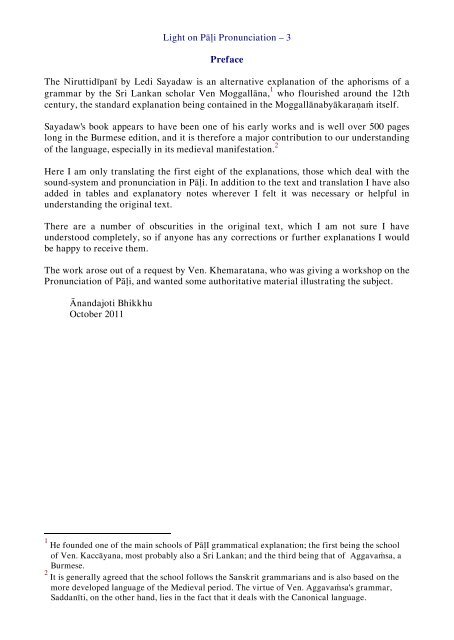Light on Pāḷi Pronunciation
A translation of the opening section of the Niruttidīpanī by Ledi Sayadaw, which is an alternative explanation of the aphorisms of the grammar by Ven Moggallāna.
A translation of the opening section of the Niruttidīpanī by Ledi Sayadaw, which is an alternative explanation of the aphorisms of the grammar by Ven Moggallāna.
You also want an ePaper? Increase the reach of your titles
YUMPU automatically turns print PDFs into web optimized ePapers that Google loves.
<str<strong>on</strong>g>Light</str<strong>on</strong>g> <strong>on</strong> <strong>Pāḷi</strong> Pr<strong>on</strong>unciati<strong>on</strong> – 3<br />
Preface<br />
The Niruttidīpanī by Ledi Sayadaw is an alternative explanati<strong>on</strong> of the aphorisms of a<br />
grammar by the Sri Lankan scholar Ven Moggallāna, 1 who flourished around the 12th<br />
century, the standard explanati<strong>on</strong> being c<strong>on</strong>tained in the Moggallānabyākaraṇaṁ itself.<br />
Sayadaw's book appears to have been <strong>on</strong>e of his early works and is well over 500 pages<br />
l<strong>on</strong>g in the Burmese editi<strong>on</strong>, and it is therefore a major c<strong>on</strong>tributi<strong>on</strong> to our understanding<br />
of the language, especially in its medieval manifestati<strong>on</strong>. 2<br />
Here I am <strong>on</strong>ly translating the first eight of the explanati<strong>on</strong>s, those which deal with the<br />
sound-system and pr<strong>on</strong>unciati<strong>on</strong> in <strong>Pāḷi</strong>. In additi<strong>on</strong> to the text and translati<strong>on</strong> I have also<br />
added in tables and explanatory notes wherever I felt it was necessary or helpful in<br />
understanding the original text.<br />
There are a number of obscurities in the original text, which I am not sure I have<br />
understood completely, so if any<strong>on</strong>e has any correcti<strong>on</strong>s or further explanati<strong>on</strong>s I would<br />
be happy to receive them.<br />
The work arose out of a request by Ven. Khemaratana, who was giving a workshop <strong>on</strong> the<br />
Pr<strong>on</strong>unciati<strong>on</strong> of <strong>Pāḷi</strong>, and wanted some authoritative material illustrating the subject.<br />
Ānandajoti Bhikkhu<br />
October 2011<br />
1 He founded <strong>on</strong>e of the main schools of PāḷI grammatical explanati<strong>on</strong>; the first being the school<br />
of Ven. Kaccāyana, most probably also a Sri Lankan; and the third being that of Aggavaṁsa, a<br />
Burmese.<br />
2 It is generally agreed that the school follows the Sanskrit grammarians and is also based <strong>on</strong> the<br />
more developed language of the Medieval period. The virtue of Ven. Aggavaṁsa's grammar,<br />
Saddanīti, <strong>on</strong> the other hand, lies in the fact that it deals with the Can<strong>on</strong>ical language.


















